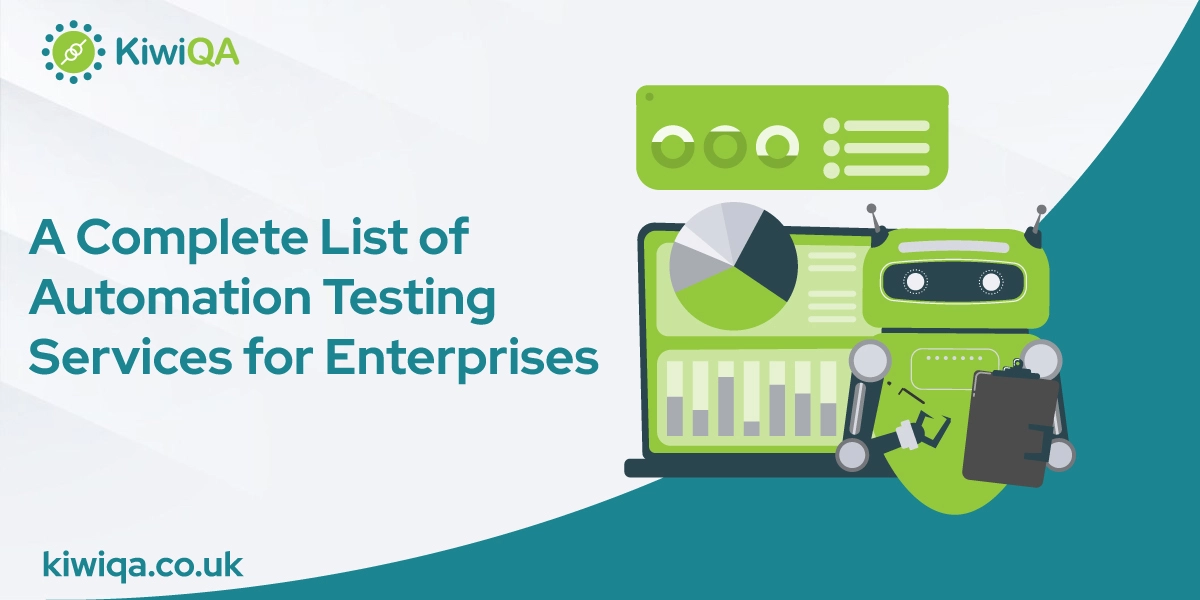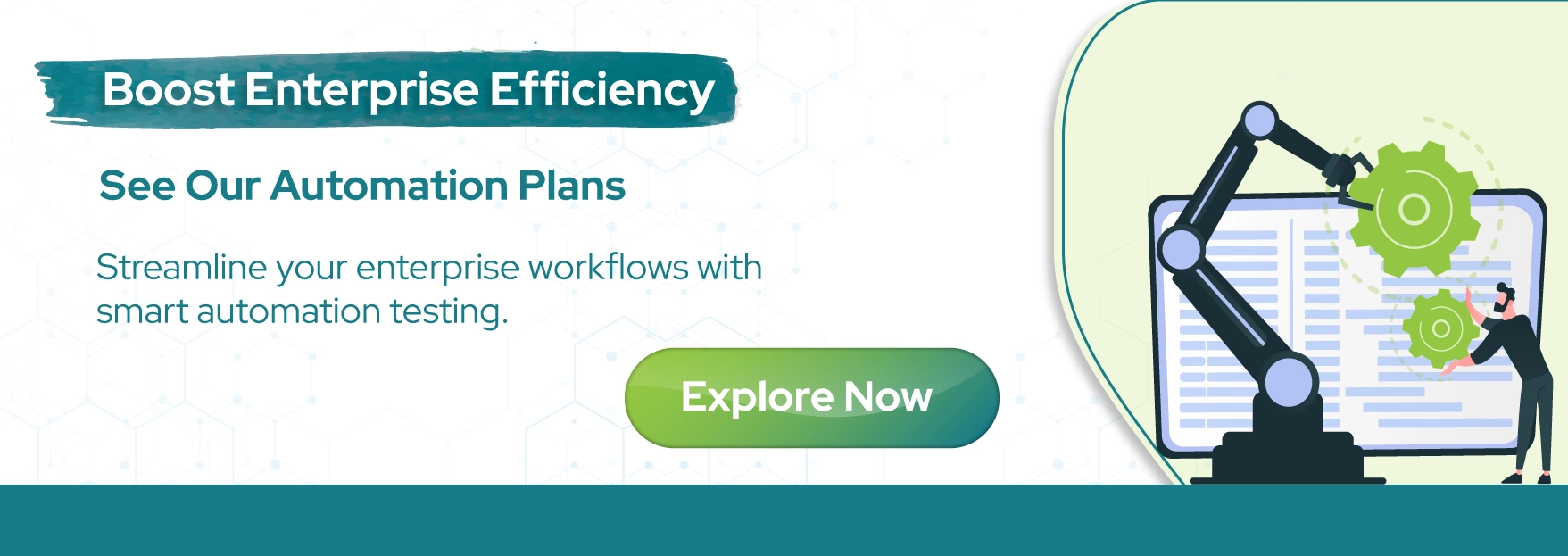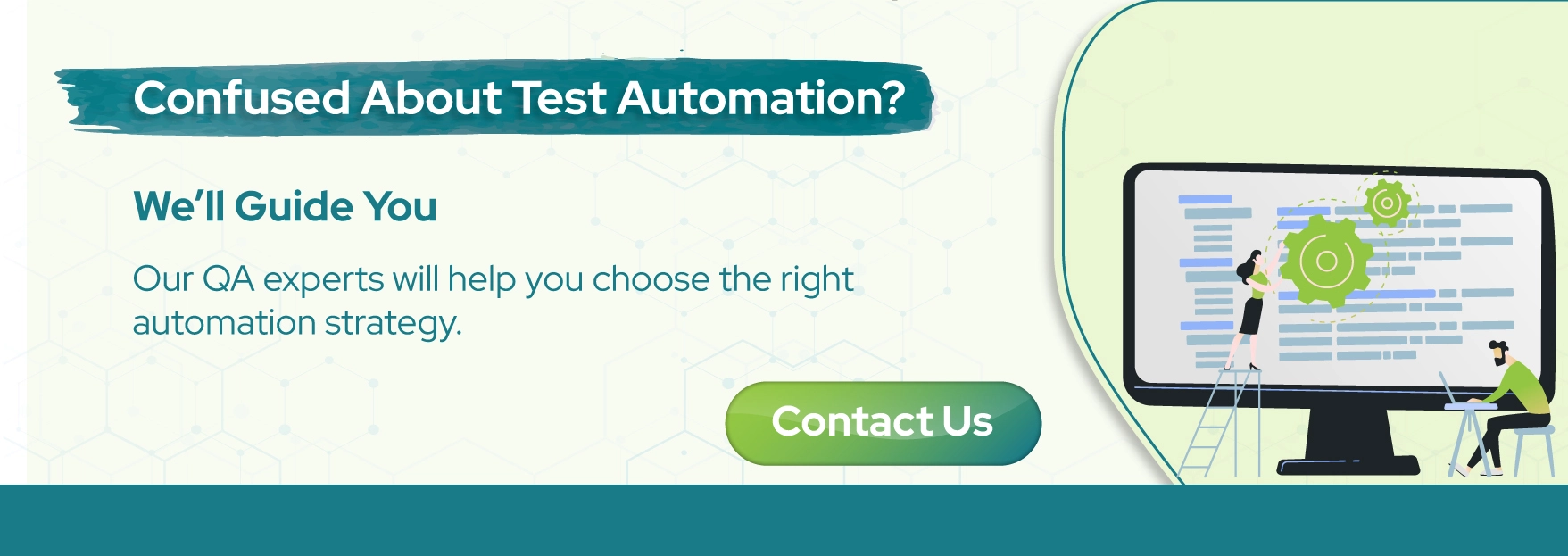In the era where digital solutions are leading as a supreme power, maintaining software quality has become important for organizational success. Addressing & implementing the scalable test automation is necessary for the product managers, testers & QA engineers. Automation testing is necessary for advanced software development & QA practices.
It includes specialized quality testing practices that aim to offer impressive outcomes. The following method drives efficiency, limits human error & facilitates the continuous integration & deployment. 40% of businesses are integrating automation software testing services regularly throughout their development cycle.
As per the report by Precedence Research, the worldwide automated testing industry will rise from USD 41.67 billion to 169.33 billion within the timeframe of 2025 to 2034. In the realm of enterprise app development, Automation testing acts as the basic strategy to ensure the reliability, performance & functionality of the app. This post is completely dedicated to understanding the role of automation testing services, testing types & future.
✧ Why Automation Testing Is Critical for Enterprises
➺ The Growing Complexity of Enterprise Software
Multiple modules and integrations
Integration of multiple enterprise app automation testing services can be more challenging than expected. However, effective integration is necessary to accelerate the data flow, allow process automation & ensure consistent reporting. Poorly connected, inconsistent data impacts operational efficiency and decision-making.
Cross-platform and device compatibility
With the growing popularity of smartphones & the rise of various OS like Windows, macOS, iOS & Android, it’s necessary for organizations to verify that the software is compatible with every platform. Failure to be compatible can result in missed opportunities and lower user satisfaction.
Depending on a study, 57% of users said they don’t want to visit businesses with poorly designed sites. Among them, 40% chose the competitor’s site after a bad mobile experience. This highlights the necessity of cross-platform compatibility in the current virtual landscape.
Frequent updates and scaling needs
Regular updates & scaling present a challenging complexity in the enterprise app due to security, system architecture, and legacy. Balancing these complexities is necessary to maintain the security & performance. To scale these challenges, organizations must opt for a robust architecture and significant resource management.
➺ Business Benefits of Test Automation
Increased testing speed and efficiency
Enterprise QA automation testing services can dramatically accelerate the testing cycle, verifying that software releases are robust and frequent. The automation testing workflow has the potential to accelerate the testing cycle, ensuring the software deployments are both rapid & robust. Furthermore, it empowers the team to integrate complex test cases during the test cycle, promising that every change in code is validated thoroughly.
Reusable test cases across projects
In test automation, a single automated test script can be utilized repeatedly across various projects. Saving time & effort on testing is possible by automation testing practices. The reusable test cases improve consistency & efficiency, enabling the team to focus on other tasks.
Better resource allocation and cost control
With the significant reduction in the manual testing approach, the QA team diverts its focus to strategic elements of SDLC. A custom enterprise software app isn’t about addressing the unique needs of a business, but an investment that pays off in the long run. Approaching automation testing, limit the manual labor costs, automate functionalities, and reduce dependencies & costs.
Higher ROI on software quality assurance
Based on the reports by Panorama, 85.5% of companies invest in software to enhance efficiency & productivity. By automating repetitive tasks, businesses can limit their manual efforts and accelerate performance. The solutions smoother workflows, optimize the resource allocation & target the unique needs.
✧ Core Automation Testing Services Enterprises Should Know
1. Functional Test Automation
Functional software automation testing services are the procedures of software tools used in the execution of tests against other software. It is used for verification that the app under test matches the necessary requirements for functionality. In manual testing,
tests are implemented manually by a QA professional, whereas automation testing includes writing scripts & utilizing software to manage the test execution. It compares the real-time outcomes with the expected outcomes & prepares a report. The functional automated testing includes various activities within the development cycle that must be performed on the website. Here, take a look at a popular functional automation test-
➺ Selenium- This free tool is utilized for automating web browsers. It supports multiple programming languages and web browsers. Implementing this tool demands the ability to set up & configure frameworks, making it a suitable option for a team with strong technical skills.
➺ Katalon Studio- This all-in-one, user-friendly tool is a comprehensive automation testing framework that aims to offer an all-in-one solution for testing in every browser. It offers codeless automation features so a person with limited coding & scripting knowledge can also access this tool.
➺ TestComplete- This commercial multi-platform tool is designed & developed by SmartBear. It supports a wide range of app types, including mobile/web. It is equipped with advanced features like AI-powered visual testing & object recognition modules.
Applied to:
➺ UI testing- The act of confirming that a software application’s UI works properly, is aesthetically consistent, and offers a seamless user experience is known as UI testing.
➺ Regression testing- The process of regression testing is used each time an application is modified. It is intended to demonstrate that no new code modification has a negative impact on the functionality of the software that already exists.
➺ Cross-browser testing- Verifying that web applications function as intended across a wide range of browsers, OS, and device combinations is known as cross-browser testing.
2. API and Web Services Testing
APIs are now a crucial component of software development since they link and move logic and data between various systems and applications. Testing APIs is one of the important factors since it continuously enhances the scalability of the testing approach and speeds up product delivery. In contrast, a web service is an element of software designed to facilitate communication between two computers connected to a network. Validating the web services through performance, security, dependability, and functionality testing is part of the process. Web service testing can be automated or done manually at an automation testing services company, just like any other test.
Focus areas:
➺ REST and SOAP API validations- To guarantee thorough test coverage, validate the various REST API methods either independently or as part of a single integrated test.
➺ Authentication and security tests- Determine weak points and provide safe service access. Verify authentication and see if private information is encrypted while being transmitted.
➺ Performance under load- Test the API’s functionality under demanding circumstances by simulating numerous users accessing it.
Also Read: API Automation Testing Tools Comparison: Features, Pros, and Cons
3. Performance and Load Testing
Performance testing automation services involve multiple testing types designed for finding the overall performance of the system under various conditions. Load testing is the specific performance testing type that measures how an enterprise app performs under expected user loads. It stimulates the real-time user amount interacting with the app to track performance errors & ensure the system can manage the anticipated traffic.
Services offered:
➺ Load testing- A non-functional software testing method called load testing involves running the program under a predefined expected load. When multiple people use the software program simultaneously, it decides how it works.
➺ Stress testing- You can learn how the system performs under pressure during periods of high traffic by conducting stress testing.
➺ Scalability testing- This kind of non-functional testing assesses an application’s performance by looking at its ability to scale up or down user requests, in addition to other performance-related aspects.
4. Continuous Testing in CI/CD Pipelines
Most of the business opts for software development practices, CI/CD to verify reliable & continuous product delivery. Neglecting the changes in code can lead to unreliable infrastructure. With the growing team, it’s tough to scale the manual process. The robust CI/CD pipeline relies on automated testing. CI allows the development team to modify the code for bug fixing & addressing the organization’s requirements that need to be tested frequently. On the other hand, CD enables users to get the latest version of software at the earliest. The CI/CD pipeline aims to verify a smooth, uninterrupted flow of app release.
Key benefits:
➺ Faster feedback cycles- Speed is the key to the continuous delivery process. The parallel execution of automated tests gives quick output & shortens the STLC. The testing also helps various teams to collaborate throughout the development cycle while discovering advanced ways to automate the testing process.
➺ Early defect detection- When you use the right CI/CD testing, it allows easy identification & issue fixing in real-time. This testing speeds up the development & deployment, while limiting the error through manual testing.
➺ Improved deployment confidence- By integrating this testing into the enterprise app, businesses can address the security & quality loopholes. Businesses can deploy their apps with confidence by following consistent test planning & execution practices.
5. Mobile Test Automation
It refers to mobile automation testing services, which include the implementation of specialized tools & scripts to execute the test. It is used for validation of the app’s behavior & ensures it matches the desired quality standards without including a human approach.
Mobile test automation is necessary since it drives the testing process. Furthermore, it accelerates the accuracy & enables regular integration & CI/CD in SDLC. This is an important part of testing across various industries. To ensure your app is user-friendly, robust, and error-free, choose mobile test automation over manual testing. It includes-
➺ Device compatibility testing- Testing for compatibility ensures the application functions on a variety of screens, OS, and devices. Automated compatibility tests confirm that, on every platform or device, the program provides a uniform user interface.
➺ UI responsiveness checks- The UI & UX of an application are evaluated through usability testing. It emphasizes how user-friendly and straightforward the software is for final consumers. Automated usability testing can mimic user interactions to determine whether the layout and navigation of the app are intuitive.
➺ Network condition simulations- Performance testing assesses a mobile application’s functionality in a range of scenarios, such as varying network speeds, heavy user loads, and device configurations.
6. Cross-Browser and Cross-Platform Testing
Desktop PCs, tablets, cellphones, and other specialized devices with different screen resolutions, processing power, and input methods are all served by enterprise web apps. These factors in an enterprise application can be verified through cross-platform testing. Cross-browser testing verifies that the web/app functions are frequently the same across a range of web browsers and OS. It can be used to drive the audience who can view your website. It ensures that your users are guaranteed a consistent experience regardless of the consistent functionality and UI across:
➺ Different browsers (Chrome, Firefox, Safari, Edge)
➺ OS platforms (Windows, macOS, Linux)
➺ Devices (desktop, tablet, mobile)
7. Test Automation Consulting & Strategy Development
The functional blueprint to effective test automation in a large organization is provided by strategy development and consulting. The service is delivered by the QA experts & enterprise consultants. This service guarantees that automation initiatives provide the most value and are in line with overarching corporate objectives. By guaranteeing consistency, effectiveness, and scalability, these services are crucial for optimizing the ROI of automation. It includes-
➺ Assessment of current QA processes- It includes a thorough examination of an organization’s current testing procedures to pinpoint their advantages, disadvantages, and automation potential.
➺ Framework selection- It includes selecting the best framework by assessing the particular demands of the project, the team’s expertise, and the application’s technical requirements.
➺ Roadmap and ROI Planning- A strategic process, the roadmap and ROI planning for test automation describes the objectives, course, and anticipated financial gains of implementing or expanding an automated testing framework.
8. Custom Framework Development
The essential test automation services that assist businesses in creating specialized, scalable, and incredibly effective testing solutions are the development of a bespoke test automation framework. A custom framework is made to easily connect with the particular technical environment, procedures, and special applications of an organization, in contrast to off-the-shelf technologies that provide a one-size-fits-all solution.
Benefits:
The custom development is tailored to the tech stack and business logic.
The framework development is scalable and maintainable over time.
9. Test Maintenance and Script Refactoring
Test maintenance and script refactoring are essential automation testing services in a corporate setting that guarantee the automated testing suite’s long-term viability and return on investment. The practice of cleaning and redesigning code to enhance its internal organization without compromising functionality is known as “refactoring.”
10. AI-Driven Test Automation Services
By utilizing AI and machine learning to make testing quicker, smarter, and less dependent on human labor, enterprise AI-driven test automation services are revolutionizing software quality assurance. These essential software automation testing services assist businesses in maintaining quality across complicated applications, increasing test coverage, and accelerating release cycles.
Also Read: Top Performance Testing Services Companies in UK
✧ Industry-Specific Automation Testing Solutions
Tailored QA Services for Enterprise Domains
➺ Banking & Finance: If you are going to release banking & finance enterprise software, make sure it ensures compliance with regulatory and security standards. You can take a holistic approach to the automation, security, and compliance testing.
➺ Healthcare: Serious health issues can result from even a little malfunction in a system. To offer top-notch mobile and web healthcare applications, make sure the app complies with all the HIPAA compliance regulations to maintain the integrity of patients.
➺ Retail & E-commerce: Professional quality assurance software test automation services for the retail & e-commerce sector may help you provide a seamless client experience, reduce website loading times, and increase profitability.
➺ Telecom: Testing of telecom software guarantees that the systems satisfy all standards for data, voice, and video transmission. It involves performing VoIP and IVR testing as well as refining the quality of various telecom systems.
➺ Logistics: To ensure your logistics app matches all the qualities, ensure the app is equipped with GPS integration & tracking system validation features.
✧ How to Choose the Right Automation Testing Partner
Key Selection Criteria
➺ Proven enterprise experience
It’s crucial to learn more about the experience and knowledge of QA partners. The relevance of their experience to your particular demands is more important. Examine their experience in operating projects related to your industry & technology stack. Ask about the credentials, license, and ongoing professional development procedures of their staff.
➺ Domain expertise
Seek out a supplier with a solid history of using different testing approaches, including automation, security, performance, and functional testing.
➺ Tool and tech stack compatibility
Examine their proficiency in integrating test automation with CI/CD pipelines, their familiarity with cloud-based testing environments, and their capacity to modify tools. A partner’s willingness to be compatible with your existing tool showcases their professionalism and domain experience.
➺ Security standards and certifications
Since data security has become necessary with the passing days, make sure the automation testing company has a robust security framework. Ensure the QA partner delivers data protection through thorough security audits and complies with global laws.
➺ Post-deployment support and scalability
Scalability and post-deployment support are important factors to take into account when selecting an automation testing partner because they affect how well your automation investment performs over the long run. A trustworthy partner should be a long-term collaborator who can adjust to your evolving requirements and guarantee the efficacy of your testing plan.
What’s Shaping Enterprise Testing in 2026 and Beyond
➺ Increased use of AI and self-healing tests
AI is growing as a necessity of organizational testing strategy, rather than just a supporting tool. A fundamental transformation from reactive upkeep to proactive adaptation is represented by self-healing testing. AI and machine learning are used in self-healing test automation to dynamically modify scripts after changes, to verify the app’s user interface accessibility & functionality.
➺ Codeless test automation adoption
Codeless test automation is gaining popularity because it speeds up testing, reduces costs, and makes it more accessible to non-technical individuals by using visual interfaces instead of traditional code. Businesses aiming to streamline their quality assurance processes can benefit from this shift as it facilitates faster software delivery cycles, enhanced collaboration between technical and business teams, and more efficient maintenance.
➺ TestOps and centralized test management
By integrating testing operations across the SDLC and adopting TestOps with centralized test management, testing is transformed from a final stage into an ongoing, data-driven procedure.
➺ Automation in cloud-native and containerized environments (Docker, Kubernetes)
Businesses are using cloud-native technology more and more in today’s fast-paced digital environment in order to remain scalable, flexible, and competitive. Cloud Native Container Automation, a revolutionary strategy that helps businesses to simplify application deployment, management, and scaling, is at the center of this revolution.
Let’s Simplify Your Enterprise Test Automation Journey
Organizations are still looking for solutions that can simultaneously match business & IT requirements. The urge to release code faster and get significant value to your business brings automation testing to the forefront. Implementing automation testing isn’t all about selecting the right tool but about crafting a strategic blueprint. Whether you are scaling your testing process or just want to start your automation testing journey, choose automation testing services & release a future-proof solution.











Comments are closed.